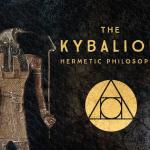
No matter which Christian link you click, someone will have defined it as a monotheistic faith. What this means is that the world’s most popular religion believes in One All-Supreme Being who reigns over everything else. This standpoint applies to each notch on the Abrahamic belt, be it Judaism, Islam, Rastafari, Baháʼí Faith, or any of the other numerous off-shoots. However, when investigating the depths of the Biblical doctrine, is it as clear-cut as we make it out to be?
Truthfully, there is a multitude of evidence against this One God theory in relation to Christianity, at least in the stricter sense. So let us respectfully explore this delicate topic from the very beginning of what it means to be monotheistic.
Authentic Monotheism
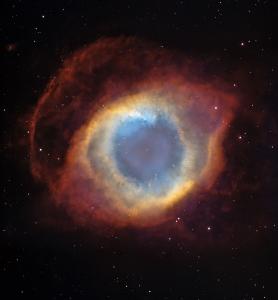
To reiterate, monotheism is the belief that one exclusive deity exists. Following that inflexible characterisation, authentic monotheism is not as common as people think. Curiously, some overlooked theologies comply with the most rigid definition of the category, such as certain sects of Hinduism. This proposal may appear strange, for Hinduism boasts one of history’s widest canons of multi-gods (polytheistic). However, these deities are merely extensions of a larger force, namely Brahman (not to be confused with Brahma), the Highest Universal Principle and the Ultimate Reality.
The only reason we don’t recognise Hinduism in the monotheistic group is its fluidity. When picking this religion apart, an array of labels can apply to the faith, which includes pantheism (or panentheism at stretch). These philosophies state that the Universe itself is divinity, as it is the collection of the All as the One True God. You’ll find this understanding spread thick across the Eastern/Occult spiritual board, accepted by Taoism, Hermeticism, Neoplatonism, Neopaganism, Kabbalah and Theosophy (to name very few).
Within so many religious applications, this is the purest form of monotheism, as it removes the opportunity for any competitor gods to exist within our reality. Sadly, we often lose this connection due to pantheism’s independent terminology.
The History of “Monotheistic Religions”
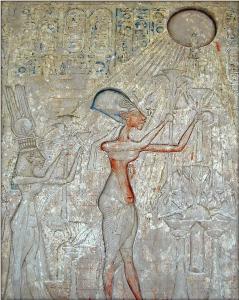
Monotheism is said to have originated with three religions. In chronological order, they were Atenism, Zoroastrianism, and Judaism. And the similar patterns in how these singular-God theories evolved are fascinating and borderline suspicious.
Around the 14th century BCE in Ancient Egypt, the people worshipped many gods. Aten was just another deity portrayed as an aspect of Ra. But Aten spoke directly to Pharaoh Akhenaten, claiming he was the One Supreme God, and Atenism was born (dying shortly after).
Around the 6th century BCE in Iranian Mythology, the people worshipped many gods. Ahura Mazda was just another deity, noted as the creator. But Ahura Mazda spoke directly to priest Zoroaster, claiming he was the One Supreme God, and Zoroastrianism (or Mazdayasna) was born, still practised by small groups today.
Finally, around the 6th century BCE in Israel, the people worshipped many gods. Yahweh was just another deity, considered a divine warrior. But Yahweh spoke directly to the prophet Isaiah, claiming he was the One Supreme God, and Judaism’s monotheism was confirmed, still with millions of followers worldwide.
Let’s break this down. Please observe how every example features:
- A polytheistic (multiple) canon of gods;
- A lone person who receives a revelation from one of those established gods;
- This deity claiming itself as the exclusive True God, instructing us to praise him alone;
- A religion developing from those foundations.
Many centuries later, Islam was founded. It followed this identical narrative too.
In the Old Testament, God Was Not Alone
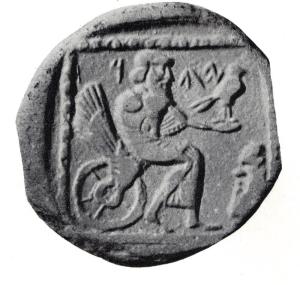
As seen above, Judaism’s Yahweh was just one character in a wider Canaanite polytheistic belief system that historians have retroactively titled Yahwism. Additional gods and goddesses in this pantheon included Baal, Shamash, Yarikh, Mot, and Astarte, who each had their own cult followers. This faith even included Yahweh’s wife, Asherah.
Yahweh’s upgrade as the Only God is the basis for the Torah. In turn, Christianity adopted this Jewish holy book as the Old Testament. But throughout this scripture, we find an abundance of information clearly stating that Yahweh was not alone in his celestial realm. Consider the very first line of the Bible as evidence:
“In the beginning, Elohim created heaven and earth.”
– Genesis 1:1 (Names of God Bible Version)
Elohim is not technically Yahweh, nor arguably even a god. Many scholars have noted that Elohim means “gods” in Hebrew, plural. However, the singular form, Eloah (abbreviated to El), was a completely different Semitic deity to Yahweh and was considered far more powerful at the time. Point proved by the final syllable of Israel, which comes from El’s name.
Throughout the Old Testament, El is discussed in various forms. These include El Shadday (Exodus 6:3), Adonay (Psalm 90:1), El Elyon (Genesis 14.18–19), El-Roi (Genesis 16:13), and Ish (Hosea 2:16). Are these simply honorary titles that God bestowed upon himself? Or are they separate gods? The two schools of thought will never be resolved.
Either way, Judaism did a decent job of cleaning up its tracks. It eventually claimed that Eloah and Yahweh were one and the same all along and even merged mentions of wife Asherah into that godly pool. But they missed a few spots, like when Eloah refers to himself as “us” in Genesis 3:22:
“And the LORD God said, Behold, the man is become as one of us, to know good and evil: and now, lest he put forth his hand, and take also of the tree of life, and eat, and live forever.”
– Genesis 3:22 (King James Version)
Or how about the Biblical mention of a divine council of gods twice in Psalms?
“God standeth in the congregation of the mighty; he judgeth among the gods.”
– Psalm 82:1 (King James Version)“The heavens will praise your wonders, Yahweh; Your faithfulness also in the assembly of the holy ones. For who in the skies can be compared to Yahweh? Who among the sons of the heavenly beings is like Yahweh, a very awesome God in the council of the holy ones, To be feared above all those who are around him? Yahweh, God of hosts, who is a mighty one like you? Yah, your faithfulness is around you.”
– Psalm 89:5-8 (World English Translation)
As light as the sunshine, the Bible itself documents gods as a plural creating the Universe. Furthermore, we have an “assembly of the holy ones” that is “in the skies” as “heavenly beings”. And don’t forget the First Commandment, “Thou shalt have no other gods before Me”, another admission of alternative divine beings in circulation. This information indicates that, even if Yahweh was the King of the Gods, he was still just one of the gods, comparable to Zeus’ Olympians or Odin to his Norse equivalent. Yet these latter examples are considered polytheistic beliefs? Why, then, is Yahweh and his gang of deities not treated the same?
There are better-suited terms than monotheism that could apply, like “henotheism” or “monolatry“. These ideas acknowledge the existence of alternate gods but worship only one. At the very least, we should recognise that those philosophies are more appropriate to the Biblical understanding of God.
Christianity Does Not Worship One God
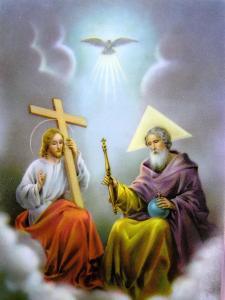
For argument’s sake, let’s say that Yahweh was the exclusive god mentioned in the Bible (even if he’s not). In that scenario, we could still pick Christianity apart further. Unlike its surrounding Abrahamic sandwich of Judaism and Islam, Christianity splits its Supreme Being into a Powerhouse Trinity: The Father, the Son, and the Holy Spirit.
The Father would be how we understand Yahweh as the Top God. The Son would be Jesus Christ, the Messiah of Christianity that separated its path from Judaism. These are two distinct entities, yet are each worshipped, which is in direct language violation of monotheism’s etymology as an absolute indivisible One God. The argument that Jesus was an extension of God’s essence is problematic because we could refocus this perspective towards any theology with a creator god emanating lower deities from itself.
The Holy Spirit is an even wilder Uno Reverse Card, as one can interpret this force as the collective life energy existing through all things. Again, this is no different to pantheistic notions presented by Dharmic or Daoist philosophies which predate the Bible by thousands of years. The defined lines between philosophies continue to blur.
Christianity Worships an Array of Pagan Deities

When surveying the vast field of ancient polytheistic gods around the globe, we effortlessly register that us humans were channelling our worship into similarly segregated compartments. Each culture had idols for luck, fertility, war, finances, and disease. Of course, after monotheism took over, these focal points were absorbed into the greater God, correct?
Nope. Instead of doing away with these pockets of specifics, Christianity simply slid the tasks onto separate saints, praying to these celestial figures exactly as a Pagan would to their deities. Nothing but the names have changed!
So next time you talk about how your God is the One True God, remember that the devil lies in the details, and the details tell a considerably contradictory story.
This article was based on the Janthopoyism Bible, Chapter X.1.3. The Curious Transition into Monotheism. It’s available on Amazon now.




